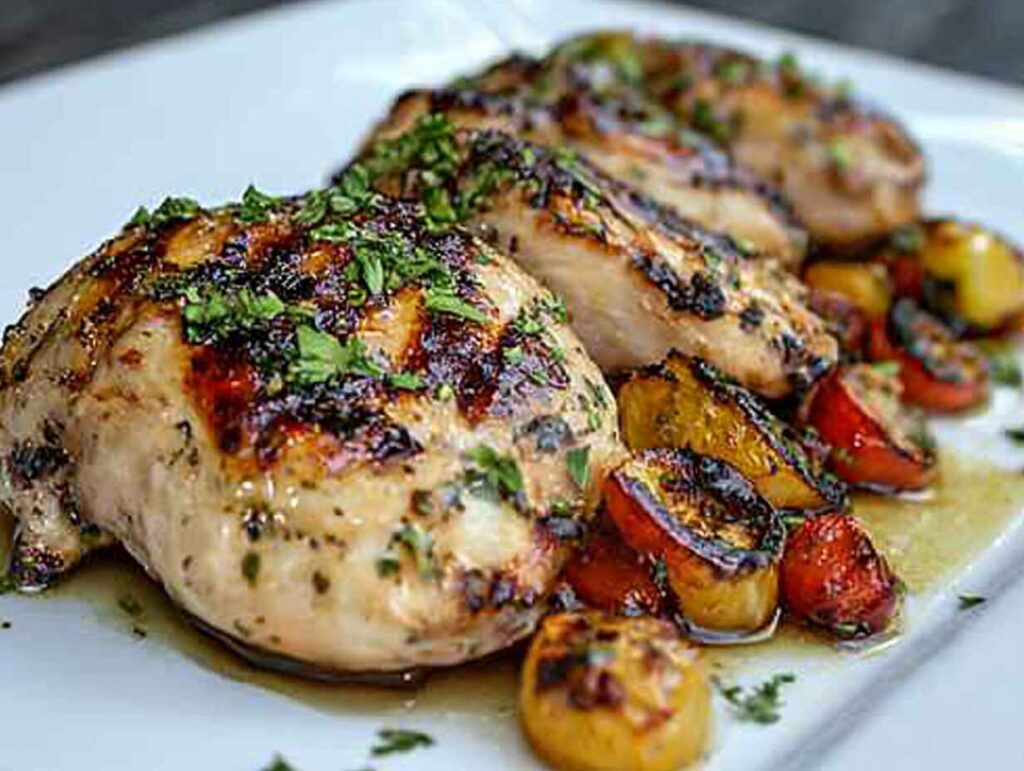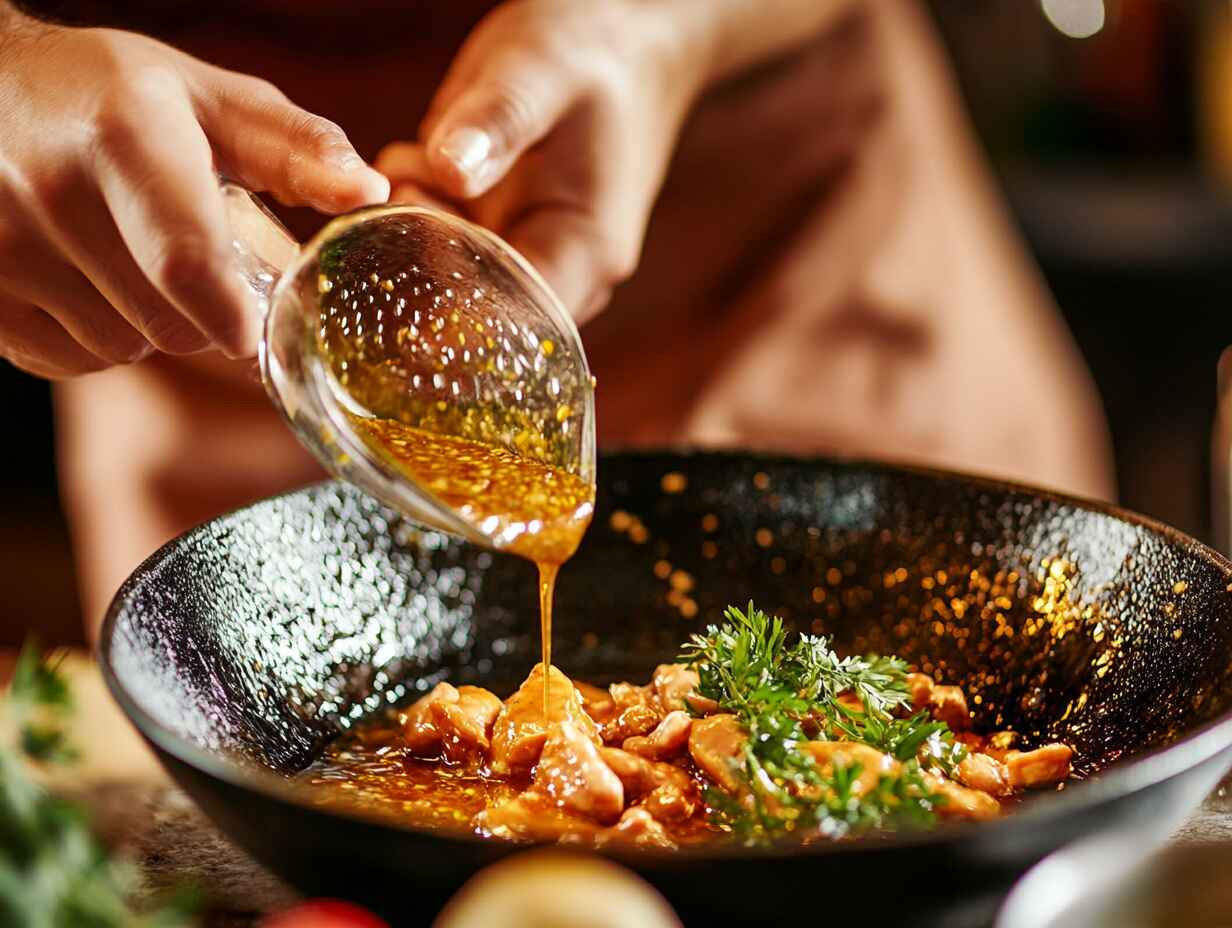Marinating chicken with vinegar is an easy and essential technique for enhancing both flavor and texture. Thanks to its acidity, vinegar helps break down the meat’s fibers, making it more tender while adding a zesty taste. This simple yet effective method can transform your chicken dishes, giving them a more flavorful and juicy result. Additionally, by experimenting with different types of vinegar, you can customize the marinade to suit a variety of dishes, making it a versatile option for any meal.
Table of Contents
Understanding the Role of Marinating chicken with Vinegar
Vinegar is a versatile kitchen ingredient, known for adding a tangy kick to dishes. When used to marinate chicken, it does more than just enhance flavor—it also tenderizes the meat, ensuring your chicken stays juicy and tender. The acidity in vinegar breaks down the fibers, resulting in a better texture. As a result, you’ll enjoy a flavorful, moist chicken dish every time. This simple yet effective method works wonders, making vinegar an essential ingredient for perfecting your chicken meals.

The Science Behind Vinegar’s Effect on Chicken
pH Level of Vinegar and Its Impact on Chicken Texture
Vinegar is acidic, with a low pH level. This acidity breaks down proteins in chicken, making the meat softer and more tender. The breakdown happens as the acid unwinds the protein fibers, allowing moisture and flavor to seep deeper into the chicken.
However, moderation is key. Marinating chicken in vinegar for too long can make the texture mushy instead of tender. It’s best to limit marinating time to 1-2 hours for optimal results.
Vinegar-based marinades not only bring bold flavors but also ensure tender, flavorful chicken. It’s a simple step that can make a big difference in your cooking.
Types of Vinegar for Marinating Chicken
Choosing the right vinegar can greatly influence the flavor and texture of your chicken. Different types of vinegar offer unique profiles, making them ideal for a variety of dishes. Let’s dive into the most popular vinegar options for marinating chicken.
White Vinegar vs. Apple Cider Vinegar
White vinegar is known for its sharp and clean flavor. It’s highly acidic, which makes it an excellent choice for tenderizing chicken. However, its intense tanginess may overpower the dish if not balanced with other ingredients like sugar, herbs, or spices.
Apple cider vinegar has a milder, slightly sweet flavor compared to white vinegar. It pairs well with chicken recipes that require a subtle tang without overpowering the dish. Its natural fruitiness adds a depth of flavor, making it a versatile option.
Balsamic Vinegar and Other Variations
Balsamic vinegar is rich and slightly sweet, offering a more complex flavor profile. It’s perfect for marinating chicken for dishes like grilled or roasted recipes where a hint of sweetness complements the savory flavors.
Red wine vinegar has a tangy and fruity taste that works well with Mediterranean or French-inspired chicken dishes. It adds brightness to the marinade and enhances the overall flavor.
Other Variations
- Rice Vinegar: Mild and slightly sweet, ideal for Asian-inspired chicken dishes.
- Malt Vinegar: Earthy and robust, best suited for hearty recipes like fried or baked chicken.

Experimenting with different vinegars allows you to create a variety of flavors, ensuring that your chicken marinade suits any cuisine or occasion.
Benefits of Marinating Chicken with Vinegar
Marinating chicken with vinegar goes beyond basic flavoring. It’s a powerful technique that enhances the taste and texture of your dish while preparing the meat for cooking. Here’s why vinegar deserves a spot in your marinades.
Vinegar as a Natural Tenderizer
Vinegar acts as a natural tenderizer by breaking down the protein chains in chicken. This process, known as denaturation, softens the meat and makes it more tender and succulent. The acidic properties of vinegar help loosen the tight bonds in muscle fibers, allowing the chicken to absorb more moisture and flavor. However, timing is crucial—over-marinating can lead to overly soft or mushy meat.
Flavor Enhancement through Vinegar
Vinegar doesn’t just tenderize—it elevates the overall flavor profile of your chicken. Its acidity balances the richness of the meat while adding a tangy kick. Vinegar acts as a flavor amplifier, enhancing the taste of other ingredients in the marinade, like herbs, spices, and oils.
Marinade Composition and Balance
The effectiveness of a vinegar-based marinade lies in achieving the right balance of ingredients. Here’s why it matters:
- Oil: Adds moisture and helps carry flavors deep into the chicken.
- Herbs and Spices: Complement the tanginess of vinegar, providing depth and complexity.
- Sweeteners: Like honey or sugar, they offset the acidity, creating a harmonious flavor profile.
A well-balanced marinade ensures that vinegar’s acidity doesn’t dominate, but instead works in harmony with other ingredients to create a perfectly flavored and tender chicken.
Using vinegar in your chicken marinades offers unmatched benefits in both flavor and texture, making it an essential ingredient for delicious and satisfying dishes.
How to Marinate Chicken with Vinegar
Marinating chicken with vinegar is simple, but getting it just right requires attention to a few details. From basic steps to timing, here’s a comprehensive guide to perfecting the process.
Basic Marinating Procedure
- Prepare the Chicken: Clean the chicken and pat it dry with a paper towel. This helps the marinade stick better.
- Mix the Marinade: Combine vinegar with oil, herbs, spices, and other flavor enhancers like garlic or ginger in a bowl. For a balanced flavor, use a ratio of 1 part vinegar to 3 parts oil.
- Coat the Chicken: Place the chicken in a resealable bag or shallow dish. Pour the marinade over it, ensuring every piece is coated evenly.
- Refrigerate: Cover the dish or seal the bag, then refrigerate the chicken to let the flavors infuse.
How Long Should You Marinate Chicken with vinegar?
The ideal marinating time depends on the cut of the chicken and the concentration of vinegar:
- Whole Chicken: Marinate for 4–6 hours.
- Chicken Breast or Thighs: 1–2 hours.
- Smaller Pieces (Wings or Cubes): 30 minutes to 1 hour.
Avoid marinating for too long, as the acidic vinegar can break down the meat excessively, leading to an undesirable mushy texture.
Vinegar and Health Benefits
Beyond enhancing flavor and tenderness, vinegar also offers notable health benefits when used in chicken marinades.
Vinegar’s Role in Digestive Health
Vinegar contains acetic acid, which has been linked to improved digestion. When used in chicken marinades, it can:
- Stimulate digestive enzymes, aiding in better nutrient absorption.
- Support gut health by promoting a balanced pH in the stomach.
Vinegar’s Antioxidant Properties
Certain types of vinegar, like apple cider and balsamic, are rich in antioxidants. These compounds can:
- Help reduce oxidative stress in the body.
- Preserve some nutrients in chicken by preventing degradation during cooking.
While the antioxidants from vinegar marinades are small, they still offer a simple way to boost the nutrition of your meals. Marinating chicken with vinegar not only enhances flavor but also contributes to a healthier, more satisfying dish. With the right technique and balance, it’s a win for both taste and health, making it an easy step toward improving your meals.
Common Mistakes to Avoid When Marinating Chicken with Vinegar
While vinegar is an excellent ingredient for marinating chicken, improper use can lead to undesirable results. Here are some common mistakes and tips to avoid them.
Using Too Much Vinegar
Excessive vinegar in your marinade can result in chicken that tastes overly acidic or tangy. This not only overpowers the flavors of other ingredients but can also affect the balance of your dish.
Tip: Stick to a ratio of 1 part vinegar to 3 parts oil, and adjust based on personal taste preferences. Adding sweeteners like honey or sugar can help balance the acidity.
Marinating for Too Long
Over-marinating chicken in vinegar can break down the meat excessively, leading to a mushy texture. This happens because the acid in vinegar denatures the proteins too much, ruining the chicken’s structure.
Tip:
- Small pieces: Marinate for 30 minutes to 1 hour.
- Larger cuts: Keep it under 4–6 hours.
Always set a timer to avoid over-marination.
Marinating Chicken with Vinegar in Different Cuisines
Vinegar is a staple ingredient in many global cuisines, each adding its unique spin to chicken marinades. Here’s how different cultures incorporate it.
Asian-Inspired Vinegar Marinades
Asian cuisines use vinegar creatively to enhance the flavor of chicken dishes. Some popular approaches include:
- Chinese: Black rice vinegar is often used for a rich, earthy flavor in dishes like sweet-and-sour chicken. It balances sweetness and acidity beautifully.
- Korean: Vinegar combined with soy sauce, garlic, and ginger is a common base for marinades in dishes like dak galbi (spicy stir-fried chicken).
- Thai: Rice vinegar is paired with lime juice, fish sauce, and chili for a zesty, tangy marinade that complements Thai grilled or fried chicken recipes.
Each of these cuisines highlights how vinegar can elevate chicken with complementary flavors, spices, and cultural traditions.
Avoiding common mistakes and exploring diverse cultural uses of vinegar in chicken marinades ensures your dishes are flavorful, tender, and perfectly balanced every time.
Mediterranean marinate chicken with Vinegar
Mediterranean cuisine is known for its vibrant flavors and healthy ingredients, and vinegar plays a central role in many chicken marinades. Here’s how different Mediterranean cultures use vinegar in their marinades:
- Greek Style: A classic Greek marinade combines red or white wine vinegar with olive oil, garlic, oregano, and lemon juice. This mix creates a tangy, herbaceous flavor profile that pairs perfectly with grilled or roasted chicken.
- Middle Eastern Touch: In Middle Eastern cuisines, vinegar is often paired with spices like cumin, coriander, and paprika. For example, a marinade might include apple cider vinegar, olive oil, and baharat (a spice blend) for a robust and aromatic flavor.
Mediterranean vinegar marinades focus on fresh, wholesome ingredients to enhance the chicken’s natural taste.
The Best Vinegar Marinade Recipes for Chicken
Here are two easy and delicious recipes for chicken marinades using vinegar.
Classic Apple Cider marinate chicken with Vinegar
This simple recipe is perfect for juicy and flavorful chicken.
Ingredients:
- ¼ cup apple cider vinegar
- ½ cup olive oil
- 2 tablespoons honey or brown sugar
- 3 garlic cloves, minced
- 1 teaspoon Dijon mustard
- 1 teaspoon dried thyme or rosemary
- Salt and pepper to taste
Instructions:
- In a bowl, whisk together the vinegar, olive oil, honey, garlic, mustard, and thyme.
- Season with salt and pepper.
- Pour the marinade over chicken pieces in a resealable bag or dish, ensuring they’re evenly coated.
- Refrigerate for 1–2 hours.
- Cook the chicken as desired—grill, bake, or pan-fry.
Zesty White Vinegar and Herb Marinade
This tangy, herb-infused marinade adds a bright and fresh flavor to chicken.
Ingredients:
- ¼ cup white vinegar
- ½ cup vegetable oil or olive oil
- 2 tablespoons fresh parsley, chopped
- 1 teaspoon dried basil
- 1 teaspoon paprika
- 1 teaspoon garlic powder
- Juice of 1 lemon
- Salt and pepper to taste
Instructions:
- Mix white vinegar, oil, herbs, paprika, garlic powder, and lemon juice in a bowl.
- Add salt and pepper and whisk to combine.
- Pour over chicken and marinate in the refrigerator for 1–2 hours.
- Grill or bake the chicken until cooked through and golden.
These recipes are easy to prepare and highlight vinegar’s versatility in creating delicious and tender chicken dishes.

Extra Tips for Perfecting Your marinate chicken with Vinegar
Use Fresh Herbs and Spices
Fresh herbs like rosemary or cilantro can enhance flavor. Crush them lightly to release their oils.
Balance the Acidity
Sweeteners like honey or brown sugar balance vinegar’s tang and help caramelize the chicken.
Incorporate Aromatics
Garlic, onions, or ginger add depth, while chili flakes or peppers bring a spicy touch.
Experiment with Oils
Try oils like sesame or avocado for a unique marinade twist.
Don’t Skip Salt
Salt draws moisture into the chicken, making it juicier.
Marinate Evenly
Use a resealable bag and flip it occasionally for even coating.
Keep it Cool
Always marinate in the fridge to ensure safety.
Reserve Some Marinade for Basting
Set aside marinade for basting during cooking to boost flavor.
Add a Citrus Boost
Lemon or lime juice complements the tang of vinegar.
Customize to Cuisine
Adapt your marinade with different ingredients based on your recipe, like soy sauce for Asian dishes or apple cider vinegar for barbecue.
These tips will help you achieve a flavor-packed, tender chicken every time.
These tips ensure your vinegar marinades are not only flavorful but also versatile and perfectly suited to your favorite chicken dishes.

FAQs: Common Questions and Answers About Marinating Chicken with Vinegar
Here are some of the most frequently asked questions about marinating chicken with vinegar, along with clear and helpful answers:
1. Can I use any type of vinegar for marinating chicken?
Yes, almost any vinegar can be used for marinating chicken, but the choice depends on the flavor profile you want. For example:
- White vinegar: Sharp and tangy, great for stronger marinades.
- Apple cider vinegar: Mildly sweet, perfect for a balanced flavor.
- Balsamic vinegar: Rich and sweet, ideal for roasted or grilled chicken.
2. How long should I marinate chicken in vinegar?
Marinating time depends on the cut and size of the chicken:
- Whole chicken: 4–6 hours.
- Breasts or thighs: 1–2 hours.
- Small pieces (like wings): 30 minutes to 1 hour.
Avoid marinating for too long to prevent the chicken from becoming mushy.
3. Does vinegar make chicken tender?
Yes, vinegar helps tenderize chicken by breaking down its protein fibers. However, over-marinating can result in overly soft or unpleasant textures, so it’s important to marinate for the recommended time.
4. Do I need to rinse chicken after marinating it in vinegar?
No, rinsing is not necessary. However, you should pat the chicken dry before cooking to ensure proper browning and avoid excessive moisture in the pan or grill.
5. Can I reuse the marinade?
No, it’s not safe to reuse marinade that has come into contact with raw chicken. If you’d like to use the marinade for basting or as a sauce, set some aside before adding the chicken, or boil the used marinade for at least 5 minutes to kill any bacteria.
6. Can vinegar marinate replace salt in the recipe?
Vinegar enhances flavor and tenderizes chicken but doesn’t replace the need for salt. Salt is crucial for balancing flavors and drawing moisture into the chicken. Use both for the best results.
7. Is marinating chicken in vinegar healthy?
Yes, using vinegar in marinades can offer health benefits:
- It’s low in calories and adds flavor without heavy sauces.
- Some vinegars, like apple cider or balsamic, contain antioxidants and may aid digestion.
8. Can I freeze marinate chicken with vinegar?
Yes, you can freeze chicken in a vinegar marinade. Place the chicken and marinade in a freezer-safe bag, seal tightly, and freeze for up to 3 months. Thaw it in the refrigerator before cooking. Include What is Chicken Dressing Recipe Ingredients Made Of?
9. What if my chicken tastes too acidic after marinating?
If the chicken tastes overly acidic, it may have been marinated too long or had too much vinegar. To balance the flavor, serve it with creamy or sweet sides, such as a yogurt sauce, honey glaze, or mashed potatoes. visit Best Chicken Dressing Recipe.
These answers provide clarity and practical guidance for marinating chicken with vinegar, ensuring delicious results every time!
Here’s a revised version with simpler and more familiar words to improve readability:
In conclusion, marinating chicken with vinegar is a simple and effective way to enhance both flavor and texture. The acidity in vinegar helps tenderize the meat, making it juicy and flavorful. Whether you use apple cider, white, or balsamic vinegar, this technique works well with any dish. By marinating for the right amount of time and balancing the ingredients, you can ensure your chicken turns out tender and delicious every time. Overall, it’s an easy method that consistently delivers great results.
